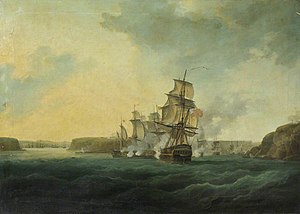 HMS Montagu forcing the enemy to move from Bertheaume Bay, 22 August 1800
| |
| History | |
|---|---|
| Name | HMS Montague |
| Ordered | 16 July 1774 |
| Builder | Chatham Dockyard |
| Laid down | 30 January 1775 |
| Launched | 28 August 1779 |
| Fate | Broken up, 1818 |
| Notes |
|
| General characteristics [1] | |
| Class and type | Alfred-class ship of the line[2] |
| Tons burthen | 1631 (bm) |
| Length | 169 ft (51.5 m) (gundeck) |
| Beam | 47 ft 2 in (14.4 m) |
| Depth of hold | 20 ft (6 m) |
| Propulsion | Sails |
| Sail plan | Full-rigged ship |
| Armament | |
HMS Montague was a 74-gun third rate ship of the line of the Royal Navy, launched on 28 August 1779 at Chatham Dockyard.[1]
Montague took part in the Battle of Cape St Vincent in 1780 and the Glorious First of June in 1794.
On 30 October 1794 Montague and Ganges captured the French corvette Jacobine. Jacobine was armed with twenty-four 12-pounder guns, and had a crew of 220 men; she was nine days out of Brest and had taken nothing.[3] The Royal Navy took Jacobine into service as HMS Matilda.
Montague was driven ashore and damaged at Saint Lucia in the Great Hurricane of 1780[4] but recovered.


In 1813 Captain Peter Heywood was appointed to command the Montagu in the North Sea and afterwards in the Mediterranean under Lord Exmouth, until July 1816. This was Heywood's last service.[5]
- ^ a b Lavery, Ships of the Line vol.1, p179.
- ^ Winfield, British Warships.
- ^ "No. 13751". The London Gazette. 10 February 1795. p. 147.
- ^ "The Marine List". New Lloyd's List (1228): 78 v. 29 December 1780.
- ^ "- National Maritime Museum".